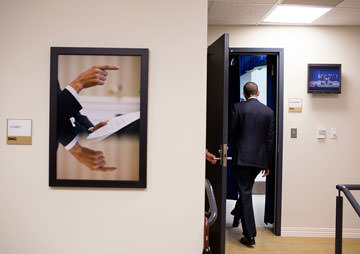A Helping Hand for Young Men of Color
"My Brother's Keeper" has a much nicer ring than "Stop and Frisk." It also promises to be a more effective, less self-defeating way to address the interlocking social and economic crises afflicting young men of color. White House/Pete Souza
White House/Pete Souza
White House/Pete Souza
“My Brother’s Keeper” has a much nicer ring than “Stop and Frisk.” It also promises to be a more effective, less self-defeating way to address the interlocking social and economic crises afflicting young men of color.
I’ll go out on a limb and predict that President Obama gets some heat for launching a program whose benefits are aimed solely at African-American and Hispanic men and boys. The nation’s first black president gets slammed by critics who accuse him of “playing the race card” every time he acknowledges that race and racism still play a role in determining opportunities and outcomes.
But obviously they do. My Brother’s Keeper, which Obama announced Thursday, is the kind of targeted public-private initiative that might actually do some good, even without tons of new federal money thrown in.
I suppose other critics might ask what took Obama so long. The president bristles at this line of questioning, pointing to the fact that his most ambitious achievements — including the Affordable Care Act — have their greatest impact among disadvantaged minorities.
Obama also understands that even if he had a Congress that would give him carte blanche, solving the problems that face young men of color would take many years of sustained effort.
You’d have to fix broken schools and broken families. You’d have to eliminate the racial bias in policing and the justice system that makes African-American and Hispanic men far more likely to be stopped, arrested and sent to prison than whites who engage in similar illegal behavior. You’d have to somehow bring enough commerce and industry back into hollowed-out neighborhoods to provide decent jobs. You’d have to convince millions of young men that the odds are not stacked against them, despite copious evidence to the contrary.
Where do you even start? Down in the trenches.
“We have credibility on these issues because we’ve been working on the ground,” La June Montgomery Tabron, president and CEO of the W.K. Kellogg Foundation, told me over lunch this week.
Kellogg is one of 10 major foundations that have agreed to join with business leaders and the federal government in the Brother’s Keeper initiative. Collectively, the foundations are already spending more than $150 million on programs aimed at young men of color. They are now pledging to invest at least another $200 million, coordinating their efforts to channel the funds toward approaches that deliver measurable results.
The other participating foundations deserve a shout-out: the Annie E. Casey Foundation, the Atlantic Philanthropies, the California Endowment, the Ford Foundation, the John R. and James L. Knight Foundation, the Kapor Center for Social Impact, the Open Society Foundations, the Robert Wood Johnson Foundation and the Bloomberg Philanthropies. Thanks and kudos to all.
As the foundations identify factors that either create or destroy opportunity for young men of color, Obama has pledged to adjust federal policy accordingly. One example is the disparity in school suspensions. The Department of Education recently issued new guidelines for enforcing “zero tolerance” school disciplinary policies after studies found that minorities were more likely than whites to be suspended for infractions.
Students who miss class time due to suspensions are less likely to graduate. And in the case of far too many young men of color, during the suspensions — when they’re not in the relative sanctuary of school — they are more likely to find themselves in potentially dangerous situations.
As Montgomery Tabron reminded me, Trayvon Martin’s home was in Miami, far from the central Florida town where he died. At the time of his fatal encounter with George Zimmerman, Martin was staying with his father for a few days because he had been suspended from school. Authorities had found what they said was marijuana residue in his backpack.
No one is arguing that young men of color are all angels. Obama has consistently preached the need for at-risk youth to take personal responsibility for their lives. Some commentators have criticized him — unfairly, he feels — for “blaming the victims” rather than the societal forces that work against them.
But the reality is that if you’re male and African-American or Hispanic, you can’t afford to make the same youthful mistakes that your white counterparts get to make. For example, blacks and whites are equally likely to smoke weed, according to surveys. But blacks are four times more likely to be arrested and jailed on marijuana charges.
That’s one of the many reasons why this race-specific initiative is so badly needed. My Brother’s Keeper isn’t a solution. But it’s a start.
Eugene Robinson’s e-mail address is eugenerobinson(at)washpost.com.
© 2014, Washington Post Writers Group
Your support matters…Independent journalism is under threat and overshadowed by heavily funded mainstream media.
You can help level the playing field. Become a member.
Your tax-deductible contribution keeps us digging beneath the headlines to give you thought-provoking, investigative reporting and analysis that unearths what's really happening- without compromise.
Give today to support our courageous, independent journalists.






You need to be a supporter to comment.
There are currently no responses to this article.
Be the first to respond.